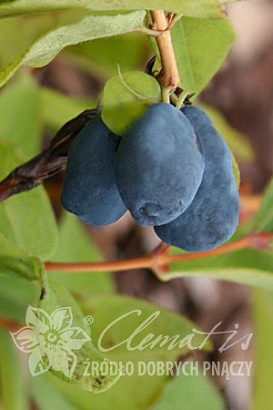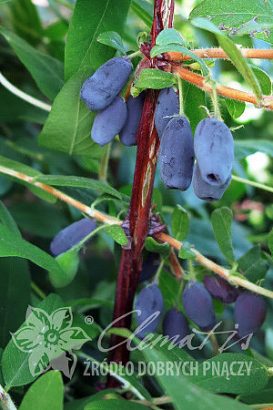Lonicera kamtschatica ‘Bakcarskaya’
haskap (blue honeysuckle, honeyberry) 'Bakcarskaya'| Decoration form | cultivated for its berries |
|---|---|
| Color of flowers | pale yellow |
| Flowering month | IV |
| Annual growth | --- |
| Aspect | sun, 3/4 sun, 1/2 sun |
| Frost hardiness | Zones 3 - 7 |
| Density on 1m2 | 1 |
| Evergreen plant | no |
Long-lived and highly frost hardy plant cultivated for its tasty and healthy fruit, ripening early in our climate. Its upright form reaches 1.7 m height. Pale yellow, modest but rich in nectar flowers borne in the first half of April. The plant requires cross pollination therefore Lonicera yields fruit best when planted in a vicinity of other varieties of this species. The first berries set early – plants in the C2 container yield fruit in the 2nd or 3rd year after planting. After another couple of years the crop is 2-6 kg of one plant. The variety sets fruit at the end of May–beginning of June. Its berries are delicious and aromatic, sweet-sour without any bitterness. They’re fusiform , dark-blue with a lighter waxy film. They stay on the branches relatively long. Rich in vitamins, macro and microelements (magnesium, iron, copper and iodine) they contain anthocyanins and ascorbic acid. They’re delicious eaten raw and out of season they’re an excellent component of jams, juice or liquors. They can be dried or frozen and are also valuable as a natural, red food colouring. The plant does not require any special care. It is healthy, pest and disease resistant. It yields fruit best in light and penetrable soil, slightly acidic (it does not require acidifying of the soil like blueberry but it dies back when planted in alkaline soil). Despite low soil requirements it is sensitive to draughts due to its shallow root system. Prefers sites in full sun. Does not need regular pruning. In its first seasons grows slowly and only after a couple of years when it becomes dense some thinning is recommended. Excessive pruning will limit the fruit yielding.




